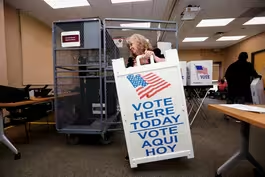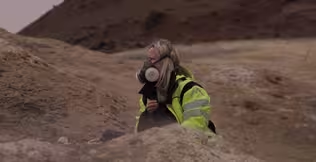
Aid worker on conditions in Gaza City after famine declared
Clip: 8/23/2025 | 5m 50sVideo has Closed Captions
‘Purely in survival mode’: Aid worker shares conditions in Gaza City after famine declared
Officials in Gaza say Israeli strikes and gunfire killed at least 33 people, including Palestinians sheltering in tents and seeking scarce food. It comes a day after the IPC declared that Gaza City is in the grips of a famine and projected that famine will spread to much of the rest of Gaza by the end of September. John Yang speaks with Oxfam’s Chris McIntosh about conditions inside Gaza City.
Problems playing video? | Closed Captioning Feedback
Problems playing video? | Closed Captioning Feedback
Major corporate funding for the PBS News Hour is provided by BDO, BNSF, Consumer Cellular, American Cruise Lines, and Raymond James. Funding for the PBS NewsHour Weekend is provided by...

Aid worker on conditions in Gaza City after famine declared
Clip: 8/23/2025 | 5m 50sVideo has Closed Captions
Officials in Gaza say Israeli strikes and gunfire killed at least 33 people, including Palestinians sheltering in tents and seeking scarce food. It comes a day after the IPC declared that Gaza City is in the grips of a famine and projected that famine will spread to much of the rest of Gaza by the end of September. John Yang speaks with Oxfam’s Chris McIntosh about conditions inside Gaza City.
Problems playing video? | Closed Captioning Feedback
How to Watch PBS News Hour
PBS News Hour is available to stream on pbs.org and the free PBS App, available on iPhone, Apple TV, Android TV, Android smartphones, Amazon Fire TV, Amazon Fire Tablet, Roku, Samsung Smart TV, and Vizio.
Providing Support for PBS.org
Learn Moreabout PBS online sponsorshipJOHN YANG: Good evening.
I'm John Yang.
It's been another deadly day in Gaza.
Officials there say at least 33 people have been killed by Israeli strikes and shootings.
Among them were Palestinians who were sheltering in tents and who were seeking scarce food.
It comes a day after a U.N.-backed group that monitors food crises declared that a half million Palestinians living in the Gaza City area are in the grips of a potentially life threatening man made famine.
What's more, the group, the Integrated Food Security Phase Classification, or IPC, projects that by the end of September, famine will spread to much of the rest of Gaza.
Earlier, I spoke with Chris McIntosh, Oxfam's humanitarian response adviser in Gaza.
He's in Gaza City.
CHRIS MCINTOSH, Humanitarian Response Advisor in Gaza, Oxfam: Right now in Gaza, what we're seeing is exactly what were predicting for months, ever since the imposition of the blockade at the beginning of March.
And in that time, very few trucks have gotten in very limited amounts of food.
So what we're seeing is people that are gaunt, people that are drawn in the face and they're bony because they haven't eaten, because they're fundamentally malnourished.
They're not getting enough food.
They're not getting the right amounts of food.
And this is on top of the devastating bombing that's happening on a daily basis here in the Gulf Strip.
JOHN YANG: The IPC report said immediate, large scale, unobstructed, multi sector humanitarian assistance is needed.
What would that look like?
CHRIS MCINTOSH: What that would look like is the crossings into Gaza would be opened and unfettered access to supplies would come in, for starters.
Secondly, that would require a ceasefire.
People are in need of nearly everything, including food, of course, access to health care, and they need to start living dignified lives, and that's just not happening.
JOHN YANG: Prime Minister Netanyahu called the report an outright lie.
U.S. ambassador to Israel Mike Huckabee said tons of food has gone into Gaza, but Hamas savages stole it, ate lots of it to become corpulent, sold it on the black market.
What do you say to that?
CHRIS MCINTOSH: I say that couldn't be further from the truth, John.
And just to use basic metrics to get the point across here, prior to the blockade being imposed at the beginning of March, there were approximately 600 trucks being brought into Gaza every day.
And now we're looking at one-sixth of that.
These notions that there is tons coming in, it's just not true.
And it's missing absolutely critical nuance.
But this is how the Israelis operate.
Fundamentally, they will create the conditions by which a simple yes or no question needs to be answered in the affirmative.
Is there aid coming into Gaza?
The answer is yes.
But the next question needs to be, is it enough?
And that answer is a resounding absolutely not.
JOHN YANG: Is there more aid sitting at the border is waiting to come in?
CHRIS MCINTOSH: This is one of the tragic ironies of the situation.
Without any question, there's a food 360 degrees around the Gaza Strip, and agencies like Oxfam have for us in particular, to the tune of 205 half million dollars worth of food and other equipment waiting there at the border.
The problem is our organization and about 60 others were told that we're simply not authorized to bring in any aid.
JOHN YANG: How is your staff, your workers, how are they dealing with this, coping with this problem?
CHRIS MCINTOSH: What I'm seeing right now is our staff and people on the street, purely in survival mode, of finding that enough clean water for themselves and their family, about finding a food that will sustain them through the next day and then doing it all over the next day.
But the average Gazan is under a tremendous amount of pressure most of their day, 75 percent of their day is just dedicated to actions that will help them survive and their families.
JOHN YANG: Could there be long term health effects even if food started flowing again?
Has sort of damage already been done to people's health?
CHRIS MCINTOSH: Unfortunately, yes.
Children, if they go sustained periods of being malnourished, they'll experience developmental problems that can last the rest of their lives.
And so that's why it's so critical.
And people are starving, children are malnourished to the degree that it will last, leave lasting effects and people are dying.
JOHN YANG: Give us a sense of what it's like, not just the physical problems right now, but just what it's like to be there.
CHRIS MCINTOSH: Let me put it this way.
Having grown up in Northeast Ohio, I wasn't prepared for what I'm seeing on the ground now.
There's no aspect of existence that's not polluted by what's happening here.
In the mornings in Deir al-Balah, I look out the window of the kitchen and I see that there's a yellow dumpster right outside the window.
Down on the street.
Lately, on a daily basis, I see children inside that dumpster, searching, rummaging all the way down to the bottom to find a scrap of food, to find something that will burn so that their families can cook or something otherwise that can be sold for food.
And I think it says a lot about where we are right now.
And nobody should have to experience that, especially not children.
JOHN YANG: What can be done?
CHRIS MCINTOSH: I'm a firm believer that periods of darkness are an invitation.
It's an invitation to be the light, to carry us out of that darkness.
This is the darkness that we read about in history books.
And that invitation is to be the country that we tell ourselves we are, to be the country that we want to be, and ultimately to be the country that we should be.
So the action is in petitioning representatives and making it clear that we don't want to be on the bad side of history.
We want to be the light, and we don't want to contribute to the darkness any longer.
JOHN YANG: Chris McIntosh, a Oxfam from Gaza City, thank you very much.
CHRIS MCINTOSH: Thank you.
Does Trump have the power to end mail-in voting?
Video has Closed Captions
Clip: 8/23/2025 | 6m 18s | Does Trump have the power to end mail-in voting? Legal scholar weighs in (6m 18s)
News Wrap: ICE seeks to deport Abrego Garcia to Uganda
Video has Closed Captions
Clip: 8/23/2025 | 4m 15s | News Wrap: ICE seeks to deport Kilmar Abrego Garcia to Uganda (4m 15s)
Scientists study effect of melting glaciers on volcanoes
Video has Closed Captions
Clip: 8/23/2025 | 6m 43s | As glaciers melt, scientists study potential for more violent volcanic eruptions (6m 43s)
Providing Support for PBS.org
Learn Moreabout PBS online sponsorshipSupport for PBS provided by:
Major corporate funding for the PBS News Hour is provided by BDO, BNSF, Consumer Cellular, American Cruise Lines, and Raymond James. Funding for the PBS NewsHour Weekend is provided by...












